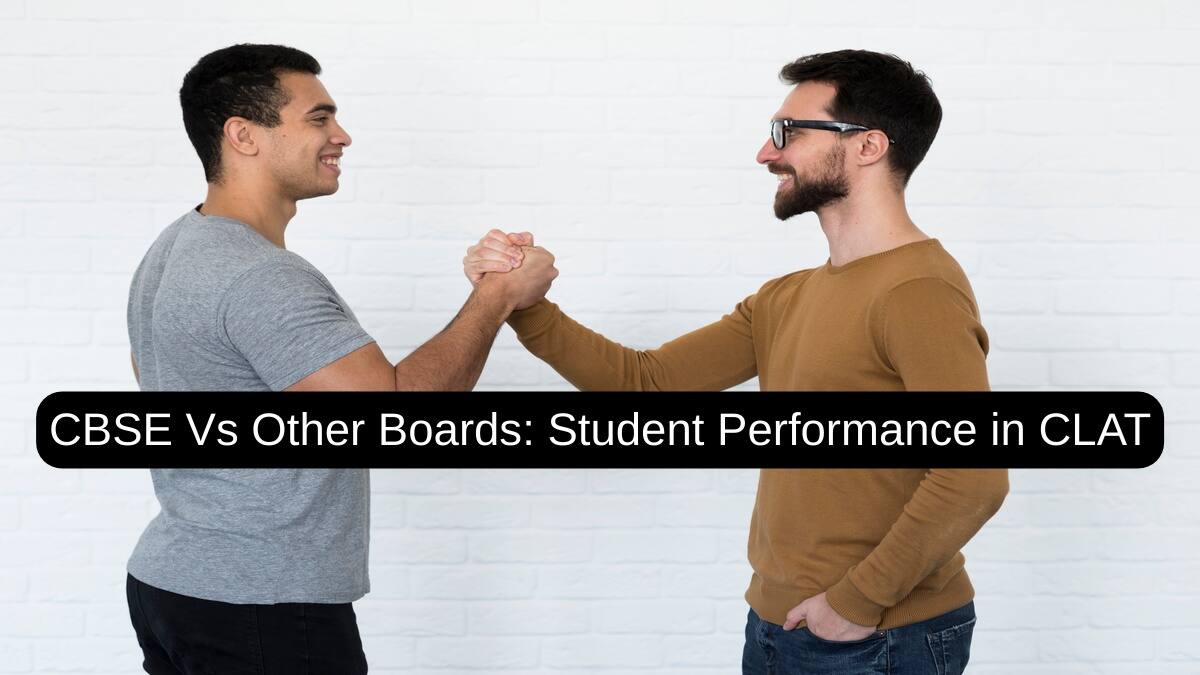Jindal Global Law School Admissions 2026
Ranked #1 Law School in India & South Asia by QS- World University Rankings | Merit cum means scholarships | Early Admissions (Pahse 2) Deadline: 28th Feb’26
An RTI response by the Consortium of NLUs provides some interesting facts about the background of the candidates who get the CLAT 2025 counselling invites. The RTI data reveals that 58% of the candidates invited for the CLAT counselling process come from schools affiliated to the Central Board of Secondary Education (CBSE). If compared with the number of schools CBSE and other boards have, the data indicates that CBSE schools send almost 6 times more students in CLAT counselling than all other boards combined.

The high success percentage of students from CBSE-affiliated schools assumes even more significance when considering that the share of CBSE schools in the total number of higher secondary schools in India is only 18%. It means that 18% of the schools produce 58% of the students who succeed in the Common Law Admission Test. But why is this so? Let’s find out in this article.
The RTI data available for CLAT 2024 counselling invitees is given in the table below. The data shows that 58% of the counselling invitees come from CBSE schools, and 42% come from schools of other boards. The total number of candidates who appeared for CLAT UG 2024 was 53180 out of 54808 who completed CLAT registration. Out of this, around 42% received counselling invites.
Ranked #1 Law School in India & South Asia by QS- World University Rankings | Merit cum means scholarships | Early Admissions (Pahse 2) Deadline: 28th Feb’26
Among top 100 Universities Globally in the Times Higher Education (THE) Interdisciplinary Science Rankings 2026
| Particulars | No. of students qualified for counselling | Percentage |
|---|---|---|
Candidates from CBSE board | 12827 | 58% |
Candidates from state and other boards | 9390 | 42% |
Total | 22217 | 100% |
Around 1.50 lakh schools are offering senior secondary education in India. Of these, 28,135 CBSE schools which make up about 18% of the schools. The remaining 82% of the schools from other boards add up to 121,865. These schools include those affiliated to the Indian Certificate of Secondary Education (ICSE), state boards, the National Institute of Open Schooling, the International Baccalaureate (IB) and others.
| Particulars | Details | Percentage share |
|---|---|---|
CBSE Schools | 28135 | 18% |
Other Schools | 121865 | 82% |
Total | 150000 | 100% |
The table below compares the number of candidates qualified for CLAT 2025 counselling and the number of schools in CBSE and other Boards. The data points out that the success rate of CBSE students in CLAT is approximately 6 times higher than that of students from other boards.
| Board | Number of schools | No. of candidates qualified | Success rate |
|---|---|---|---|
CBSE | 28135 | 12827 | 46% |
Other board | 121865 | 9390 | 8% |
There are four main reasons why students from CBSE-affiliated schools are six times more likely to succeed in CLAT than other candidates.
CBSE’s curriculum is more closely aligned with the syllabus of various national-level law entrance exams such as CLAT.
The primary source of questions for national-level entrance exams is the NCERT textbook used in CBSE schools.
Student assessments in CBSE schools are based on multiple-choice questions that test the candidate’s logical and critical thinking skills, which are also the same skills tested in most national-level entrance exams.
CBSE students often have better access to study material, coaching centres and mentors, which help them perform better in the entrance exams.
The table given below provides the estimated number of counselling invitees for the CLAT 2025 counselling process based on the available data. It must be noted that due to ongoing CLAT 2025 court cases, the Consortium has postponed the counselling process indefinitely.
Particulars | Details |
|---|---|
No. of candidates registered | 62832 |
No. of candidates appeared | 60544 |
No. of Counselling Invitees | 25400 (approx 42%) |
On Question asked by student community
Most law colleges require entrance exams like CLAT or state-level law entrance tests. Some private universities may offer direct admission. Visit the official website of the college, fill out the application form, upload required documents, pay the fee, and complete counselling if required.
With a CLAT score of 71.35, you can apply for admission to NLU for mid-to-lower-tier NLU courses, with a state rank of 69.
With a CLAT 2026 rank of 33,825, it's difficult to get a seat at GNLU Silvassa in the initial stages.
You should focus on private institutions, where a CLAT 2026 rank of 33,825 has a higher chance of admission.
For information on domicile quota seats, see this - CLAT Domicile
You can check the admission chances of your daughter at specific law colleges by using the link provided below by entering the required information.
Most top NLUs like NLSIU Bengaluru, NALSAR Hyderabad, WBNUJS Kolkata, NLIU Bhopal have SC closing ranks well below 4836, so admission there is highly unlikely. For NLU Odisha (NLUO), the BA LLB SC closing rank in CLAT UG third round was 8442 and BBA LLB SC closing rank was 9688,
Among top 100 Universities Globally in the Times Higher Education (THE) Interdisciplinary Science Rankings 2026
NAAC A+ Accredited | Among top 2% Universities Globally (QS World University Rankings 2026)
Admissions open for B.A. LL.B. (Hons.), B.B.A. LL.B. (Hons.) and LL.B Program (3 Years) | School of Law, MRU ranked No. 1 in Law Schools of Excellence in India by GHRDC (2023)
Excellent curriculum; an impressive range of electives, besides core law courses. Up to 100% merit scholarship on a first-come, first-served basis
Moot Court | Mock trials | Legal Aid Clinic
NAAC A++ Accredited | Ranked #11 by NIRF